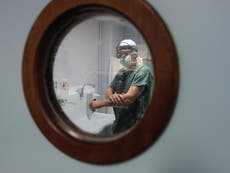If selfish Britons can't keep their distance, the government will have to scare them into saving lives
Selfish behaviour, among other things, has got us to where we are now and we are not going to turn human nature upside down

Even wartime conditions and appeals to national solidarity do not entirely eradicate human nature, or at least some of its less pleasant manifestations. Hence people blithely wandering around overcrowded parks. Hence panic shopping. For now, the coronavirus outbreak, or the fear of it, seems to be accompanied by some neuroticism.
Take panic buying or “stockpiling” to give if its more euphemistic name. The latter is in some ways a rational thing to do. If you think you will need to be holed up for a while, and if you think there might be a shortage of some items, then it makes sense to build up a reserve. If that meant buying an extra pack of loo roll or a couple of tins of soup, then our efficient supermarkets and supply chains would be able to cope easily. Everyone might have been happy, and those too old or weak to fight for the last spud in the shop - or too busy caring for the critically ill - would have enough to get by.
But what we have witnessed in the last week or so is reminiscent of other great mass hysterias of history - the Tulip mania speculative bubble in seventeenth century Holland, the Salem witch trials or various sightings of big cats in the British countryside.
This is not to trivialise the threat of coronavirus. It is, though, to question the response. At any normal rate of usage, there are people out there with sufficient big roll to see them through to 2030 - well past the span of this emergency. So, even on its own terms, it is excessive, and a lot of the food, especially the fresh stuff, will be chucked away, wasted.
Hoarding on an industrial scale is obviously wrong on the kind of communitarian grounds politicians, experts and religious leaders talk about. It is bad for the more vulnerable in society and the poor supermarket workers.
Yet these appeals to our better nature have proved mostly ineffective, as the empty shelves testify. There are two responses to this, as there are to the continued gatherings in public and private spaces.
The first is compulsion. We could implement more draconian lockdown measures, and more of the kind of soft rationing quotas for shoppers the retailers are introducing. That’s probably desirable and essential and we should get on with it. But, either way, such physical controls as these are difficult to police and some will try to evade them, as if it were some sort of game. Even in the last war there were plenty of looters, thieves and black marketeers - the term “spiv”, after all, originated in Britain’s finest hour.
The alternative is to redirect the mania into a more productive channel that suits the selfish instincts of most individuals. That means ever more terrifying propaganda about the disease and just how easy it is to catch it. And how easily you can catch it by say touching a park gate, or using the loo when out at a dinner party or indeed in a crowded supermarket. That is why obsessively washing your hands, staying indoors and staying alone as far and for as long as possible will save your life - even if you don’t care about anyone else. Why would you want to get infected buying another 48 big rolls?
Selfish behaviour, among other things, has got us to where we are now and we are not going to turn human nature upside down. Much better to repurpose it to a better end - saving your own skin.







Join our commenting forum
Join thought-provoking conversations, follow other Independent readers and see their replies